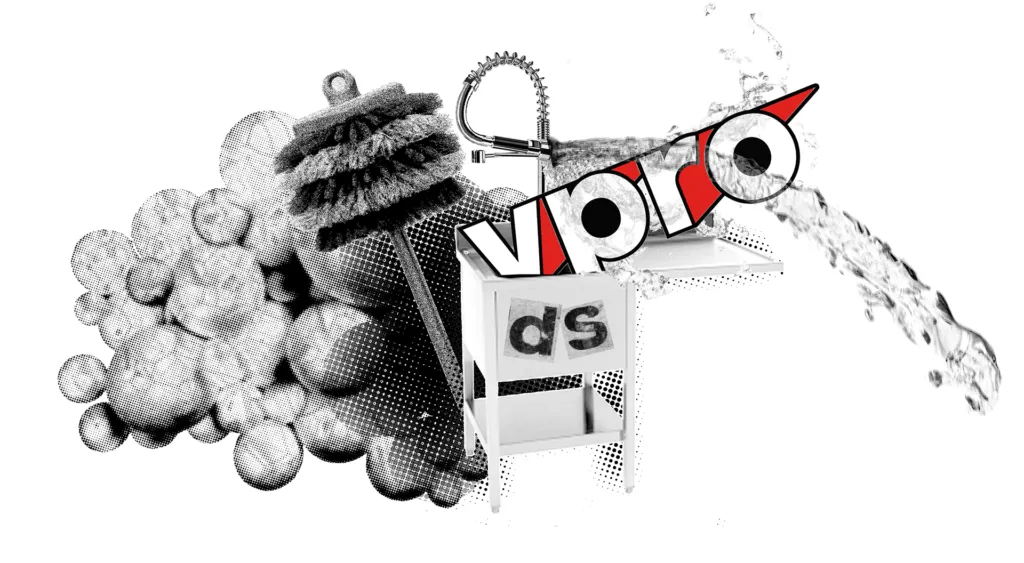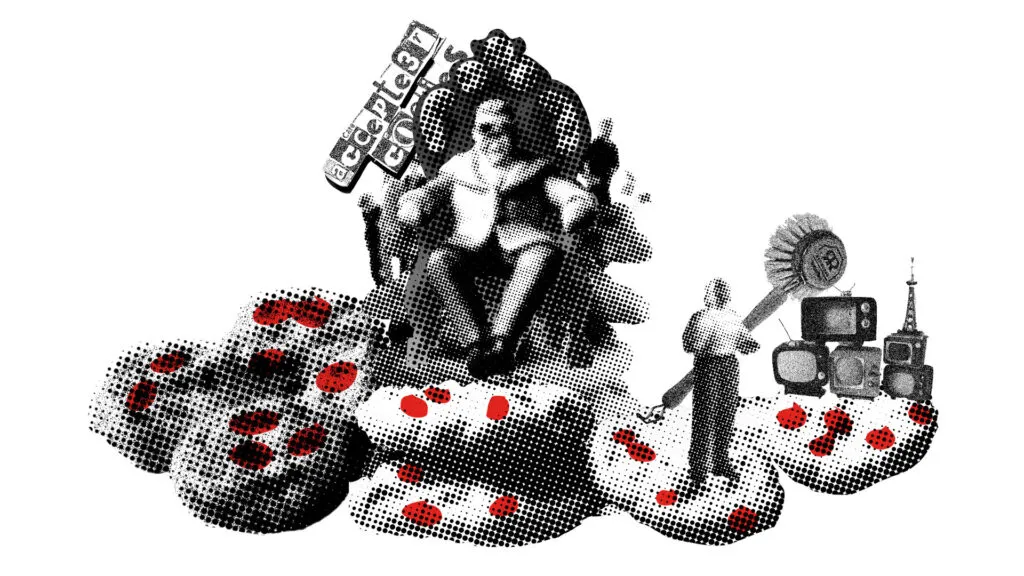Many thanks to our talented illustrator Julia Veldman C. for creating the image above.
In “A peek in the kitchen of…” we highlight an organisation that went through the Digital Powerwash. This time we go back to where it all started: the VPRO. We sat down with Onno Bruins, working in the field of data processes at VPRO, and actively involved in VPRO’s Digital Powerwash experience.
In order to provide organisations with insights into how well aligned their digital environment is with the public values defined in the PublicSpaces manifesto, we’ve developed ‘ The Digital Powerwash’. This methodology allows organisations to assess and improve the digital tools they use. The aim of the Powerwash is not to call public organisations to task, but to give them insight and tools.
In 2021, at the initiative of Geert-Jan Bogaerts Head of Innovation and Digital Media at VPRO, as well as co-founder of Public Spaces, VPRO participated in the Digital Powerwash. Could you tell a bit more about this process?
“This was basically a very dynamic process. We, a small group within VPRO, started on Geert-Jan’s initiative, to discuss how we could apply the five core values PublicSpaces had defined in its manifesto to the digital tools we were using as an organisation. Every two weeks, over a periode of six months, we met quite intensively to discuss this. You start very optimistically by looking at openness of tools, this is still pretty easy. But transparency was already a trickier one and responsibility was even more complicated, then it became almost legal. In the beginning, we really had a whole list of questions to test the tools we use. Gradually, those questions became more and more nuanced, until we only had closed questions.
At that time, we were purely testing our own digital environment as an organisation, we didn’t have the idea at all of making it a general tool for other organisations. But as the process progressed, we were like “How cool it would be if other organisations could also use this”. Besides, that would make the outcome better, more objective, less dependent on our use as an organisation of a particular software tool.”
Did going through the Digital Powerwash bring you any specific insights? Were there any particular windfalls or difficulties you ran into?
“You start to realise how much time goes into doing it really well and also that drafting really objective questions is almost impossible. The answer to the questions often depended very much on how the tool was used. Whereas, if you pour an outcome into a scoreboard, it does give the appearance of objectivity. That’s why at one point we had the idea of making it more of a general methodology. If several organisations test the same tools with the same methodology, then the outcome becomes less dependent on how each individual organisation uses the tool in question: then it really says something about the software itself.
What we really learned is that the biggest added value of the Digital Powerwash is not necessarily the outcome, but rather the process you go through in conversations within your organisation. Especially if you are a fairly large organisation like the VPRO. You have these conversations with colleagues from all kinds of different departments and viewpoints. It gives you a better understanding of the choices other teams make, because you have to ask each other questions like “Why is that particular feature of that software application important for your functioning?” and “Could you do your job without that data?” you learn a lot about what other teams are working on.
Another thing that stood out was that most of our tools are actually not open source, whereas open source is quite important at VPRO. We are really in favour of it. This simply has to do with the fact that open source techniques involve too much maintenance. We don’t always have the capacity for this. What also stood out was that some tools that we initially thought would score quite poorly actually had their affairs in order. For example, Eventbrite: although it is an American commercial company, if you look at how the data is encrypted, what you can see as a user and what you can and cannot delete, they actually scored quite high during ‘The Digital Powerwash’. What was interesting is that you really get into an ethical conversation with each other: why is it wrong for a company like Facebook to trade in personal data or for privacy-sensitive data to be stored unencrypted in America?”
Can you tell us something about the follow-up? Did you take certain steps regarding the design of your digital environment based on your final score?
“After the Powerwash, we felt compelled to replace some of our digital tools through which personal data passes with alternatives. This is, of course, a long-term process. Some tools have a big impact on the organisation and have a long so-called ‘replacement horizon’. Specifically, we have decided that we no longer want to store unencrypted data with US companies, which means that the FBI or the CIA can basically just look in if they want to. So we started looking for European alternatives where data is encrypted. We also check new software tools against the Digital Powerwash before purchasing them. Based on the outcome, we can then make a more informed decision on whether or not to engage with a certain party. There is still a communication and training challenge left here for the rest of the organisation.
We have published the final scores of all assessed tools on our website. We find it important to be transparent about this, which was why we entered the Powerwash process in the first place: transparency is very important to us, especially since we make very critical media productions on topics such as data and privacy. The moment an organisation uses tools like Facebook and requests its visitors to accept cookies, it has to be able to justify its decision and be open about it. Another follow-up project we are working on is pixel-free advertising. We are currently in talks with the supplier of a tool, Tracedoc, which you can deploy between your website and all marketing and Analytics systems. This tool ensures that conversions are measured, but strips all personal information from the data when sending it back to Facebook and Twitter, for example. This allows us to see how many times an ad was viewed on Google, Facebook or Twitter, but neither we nor these parties themselves can see who those were, so we can ensure the privacy of those using our website.
What’s extra nice is that we are exploring the suitability of (a pixelless tool like) Tracedoc together with other public broadcasters EO and BNNVARA (editor: also PublicSpaces partners). This is where we are increasingly working together. EO is already much further ahead than us on the data front, for example, and that is really inspiring and instructive for us. As a result, there is definitely also exchange in terms of knowledge and expertise.”
Can you say something about your plans for the future? How do you hope the digital transition will take shape at VPRO?
“We absolutely strive to make our online set-up as compliant as possible with the public values as defined by PublicSpaces. We realise that this is not always possible, but the moment we deviate from it, we think it is important to be transparent about this – that we can justify and explain. The Digital Powerwash has certainly made us more aware of the fact that everything nowadays collects data, and has made us more aware that, firstly, we don’t want it, secondly, we don’t need it for our work and, thirdly, we can use alternatives. So we can also put our organisation’s values at the heart of our digital environment.”
What future role do you hope PublicSpaces and the Digital Powerwash can play in the digital transition within an organisation like the VPRO?
“I really hope that the Powerwash continues to evolve into a comprehensive methodology that organisations can use, preferably prior to purchasing particular software applications. That way you will get an independent tool that organisations can use, rather than being dependent on the vendors of software applications themselves. If enough organisations go through the Digital Powerwash, I think it can certainly serve an important function in the digital transition in this way. In addition, apart from the scoreboard, I think conversations and discussions on the topic within your organisation are hugely valuable. You are forced to really critically question your own digital environment and learn a lot about the organisation as a whole.
As for PublicSpaces, I hope it develops as a think tank in the future. I hope that this will give it even more wings. After all, an organisation like PublicSpaces as well as these issues are only becoming more and more relevant. Just look at the public outcry and debate surrounding Elon Musk’s takeover of Twitter.”



